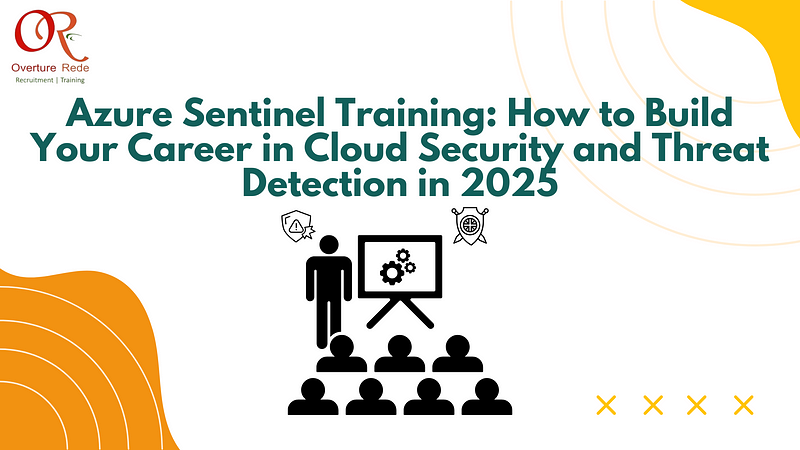Azure Sentinel Training: How to Build Your Career in Cloud Security and Threat Detection in 20

Imagine this.
You’re part of a security team at a mid-size company. One day, the dashboard lights up — suspicious logins, strange user behavior, a spike in API calls from overseas. You scramble to investigate, toggling between security logs, event data, and cloud dashboards. It’s chaotic.
Now imagine if all that intelligence were collected, analyzed, and prioritized for you. That’s Azure Sentinel in action — Microsoft’s powerful, cloud-native SIEM (Security Information and Event Management) and SOAR (Security Orchestration, Automation, and Response) platform. And it’s changing how security operations centers (SOCs) work.
In this article, we’ll break down why Azure Sentinel is a must-learn skill in 2025, what real Azure Sentinel training should include, and how you can become job-ready in a matter of weeks — even if you’re just starting out in cybersecurity.
What Is Azure Sentinel?
Azure Sentinel is Microsoft’s answer to traditional SIEM tools — many of which are bulky, on-premise, and hard to scale. Sentinel flips the model by running entirely in the cloud. That means:
- You get instant scalability without managing infrastructure
- It ingests data from any source — Microsoft services, firewalls, VPN logs, third-party tools
- You can detect, investigate, and respond to threats in real-time
- It integrates with AI and machine learning to reduce alert fatigue
- You can automate responses using playbooks built in Azure Logic Apps
Think of Sentinel as your security control center — a single pane of glass for monitoring, responding, and hardening your digital environment.
Why Learn Azure Sentinel in 2025?
Let’s look at the reality:
- Cyberattacks are more frequent and sophisticated
- Remote work and cloud adoption have expanded the attack surface
- Companies are investing more in cloud security talent
- Azure is one of the top cloud platforms globally — and Sentinel is its built-in defense mechanism
This means cybersecurity professionals who understand Azure Sentinel are in high demand.
And this isn’t just about theory. Recruiters are hiring for real-world skills:
- Writing KQL (Kusto Query Language) queries
- Building analytic rules and incident dashboards
- Setting up data connectors
- Working with Microsoft Defender, Intune, Azure AD
- Responding to incidents with automated workflows (SOAR)
What Should a Proper Azure Sentinel Training Include?
If you’re Googling “Azure Sentinel training,” you’ve probably found endless YouTube videos, scattered Microsoft docs, and maybe a few online courses.
But here’s the truth: most free tutorials don’t go deep enough.
A solid, job-oriented Azure Sentinel training program should teach you:
Foundational Concepts
- What is SIEM/SOAR, and how Azure Sentinel fits in
- Sentinel architecture and pricing model
- Role of Sentinel in a modern SOC
Core Skills
- Connecting data sources (Office 365, Azure resources, custom logs)
- Understanding log analytics and workspaces
- Writing and optimizing KQL queries
- Creating detection rules and hunting queries
- Building dashboards for threat visibility
- Managing incidents from creation to resolution
- Automating workflows with playbooks
- Integrating with Microsoft Defender, Azure Monitor, and more
Hands-On Practice
- Real-world attack simulation and detection
- Threat hunting exercises
- SOC workflow and triage scenarios
- Alert tuning and false positive management
Who Should Take Azure Sentinel Training?
This isn’t just for security engineers. Azure Sentinel skills are valuable for:
- SOC Analysts (L1–L3)
- IT Admins managing cloud environments
- Azure Engineers & Architects
- Cloud Security Specialists
- Students or freshers starting in cybersecurity
- DevOps teams integrating security into their pipelines (DevSecOps)
Even if you don’t come from a security background, Azure Sentinel is approachable — especially when taught in a structured, hands-on way.
Career Path After Azure Sentinel Training
After completing the right training, you’ll be equipped to apply for roles such as:
- Security Operations Center Analyst
- Cloud Security Engineer
- Threat Detection Analyst
- Microsoft Security Engineer
- Incident Response Specialist
Certifications such as Microsoft SC-200 (Security Operations Analyst) become easier to pursue once you’ve practiced using Sentinel in real environments.
Learn with Overture Rede: Your Trusted Training Partner
At Overture Rede, we know what the industry needs — because we’ve trained hundreds of professionals who now work in SOCs, cloud security teams, and cyber threat units globally.
Our Azure Sentinel training program focuses on real-world, job-ready skills, not just theory.
Our Training Includes:
- Instructor-led online sessions + recorded access
- Real-time labs and security scenarios
- KQL scripting workshops
- Threat simulation exercises
- Certification support (SC-200)
- Resume + interview guidance
- Mentor support even after course completion
This is not a passive course — it’s built to transform you into a confident cloud security professional.
How to Enroll
Getting started is easy. Whether you’re a beginner or upskilling professional:
Thank you for showing interest in our training programs at Overture Rede!
To take things forward, please feel free to reach out to us at: 📞 +91 95822 24661 📧 crm@overturerede.com
Final Thoughts
If you’re serious about working in cybersecurity, there’s no better time than now to learn Azure Sentinel. With cloud security taking center stage and Microsoft tools leading the way, Sentinel expertise puts you at the frontline of defense in the digital era.
Let Overture Rede help you get there — with practical training, real support, and the skills that companies are hiring for.
Comments
Post a Comment